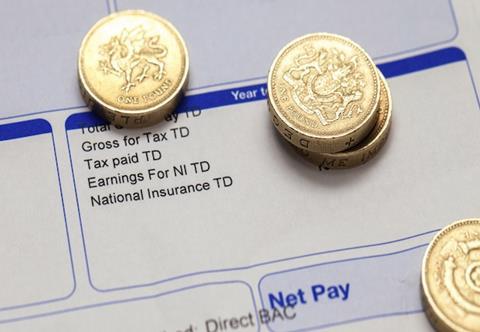
Total pay for employees in Great Britain, including bonuses, fell by 0.2% in real terms between August to October 2016 and August to October 2017, according to figures from the Office for National Statistics (ONS).
Its UK labour market: December 2017 report also found that regular pay, excluding bonus payments, fell by 0.4% in real terms, which has been adjusted for consumer price inflation, between the periods August to October 2016 and August to October 2017.
In nominal terms, which has not been adjusted for consumer price inflation, total pay has increased by 2.5% between August to October 2016 and August to October 2017. This is higher than the 2.3% recorded growth rate between July to September 2016 and July to September 2017. Regular pay, in nominal terms, has increased by 2.3% between August to October 2016 and August to October 2017, compared to a 2.2% growth rate recorded between July to September 2016 and July to September 2017.
Average total pay, including bonuses, was £510 a week in nominal terms before tax and other deductions from pay for employees in Great Britain in October 2017. This compares to £498 a week in October 2016. Average regular pay, excluding bonuses, was £478 a week for British employees in October 2017 before tax and other deductions from pay. This compares to £467 a week in October 2017.
In real terms, average total pay for employees in Great Britain was £490 a week in October 2017, before tax and other deductions from pay. Average regular pay in real terms, excluding bonus payments, was £459 a week in October 2017, before tax and other deductions from pay.
Average total pay for employees in Great Britain, in nominal terms, increased by 35.5% between January 2005 and October 2017, rising from £376 a week to £510. Over the same time period, the Consumer Prices Index, including occupiers’ housing costs, increased by 33%.
Doug Monro, co-founder at Adzuna, said: “With the inflation rate currently sitting at a near six-year high and food prices rising, jobseekers and employees are still likely to feel the pinch as the cost of Christmas mounts. However, not everyone's stockings will be filled with coal as jobseekers and employees in some industries are rewarded for the resilient nature of UK jobs market, with sectors such as retail enjoying an annual salary rise of 7.3%.”
Ian Brinkley, acting chief economist at the Chartered Institute for Personnel and Development (CIPD), added: “While average earnings figures improved slightly compared to previous quarters, high inflation means that real wages continue to fall which will leave households struggling over Christmas and into the new year. The continued squeeze on living standards shows little sign of abating in the immediate future, though with inflation predicted to fall back towards 2% later in 2018, there may be some light at the end of the tunnel.”
Mariano Mamertino, Europe, Middle East and Africa (EMEA) economist at Indeed, said: “Real wages have now fallen for eight months in a row, meaning the rocketing cost of living is leaving [employees] more out of pocket every month. Depending on whether you’re a glass half full or half empty person, the economy’s abject failure to deliver real wage growth is either a sign of pay rises to come or evidence the labour market is becoming dysfunctional.
“To be fair, strides have been made in 2017. Hundreds of thousands of new jobs have been created, and the lion’s share of them are full, rather than part-time, roles. But such progress risks being a footnote to the UK’s brewing wage crisis.”
Ben Brettell, senior economist at Hargreaves Lansdown, added: “Wages in the three months to October grew 2.5% on a year earlier, an acceleration from the previous month’s 2.3%. But the consumer squeeze which has been evident since last year’s referendum continues, as pay adjusted for inflation is still falling.
“The bigger picture is that the labour market remains robust, with employment close to all-time highs and plenty of vacancies if you’re seeking work. The pay squeeze continues for now, but with wages growing a little more strongly and inflation set to fall back in the new year, this looks like it’ll come to an end in the next few months. We should remember, however, that the only true driver of real pay growth and rising living standards is productivity growth. This is something the UK has struggled with since the financial crisis and, as yet, nobody seems to have solved the puzzle.”











